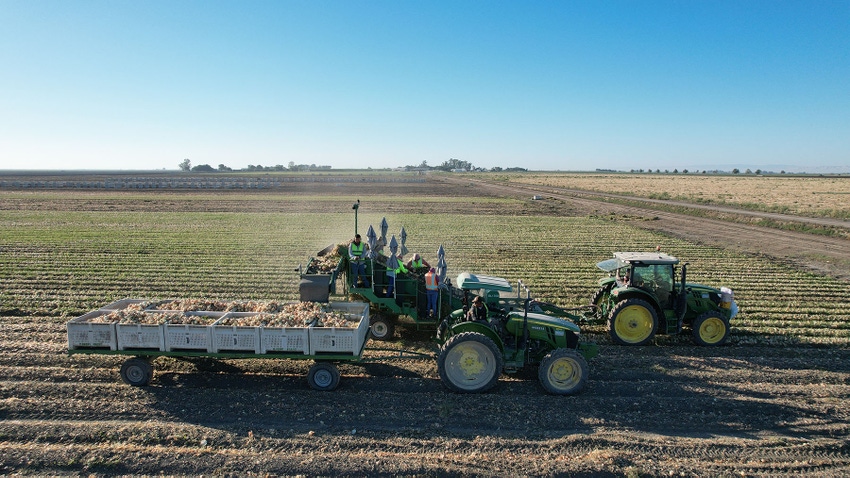
This is part five in a series.
Farmers have enough worries when it comes to getting a good yield. But what about the laws regarding practices or employees? Will ESG policies impact your profit margin? We asked Derek Azevedo to weigh in on a host of challenges farmers face in a wide-ranging series that began Monday and is wrapping up today. Azevedo is executive vice president and COO at Bowles Farming Co., a respected 11,900-acre specialty crop farm near Los Banos, CA., with 60 full-time employees that swells to 500 or more each summer.
You farm in a highly regulated region of the world. What can row crop farmers learn from you?
When I talk to my buddies in Kansas and Alabama they say, ‘There’s no way I could farm where you farm. I understand why folks from other regions point to the craziness of California. But the truth is, they’ll probably be farming like we do, eventually. It’s easy for farmers to complain about all these regulations --which isn’t the best look for agriculture. The truth is, a lot of our policies are good. Workers have access to bathrooms, water, and shade; we always pay them as much as we can; there are good environmental protections here, safe working conditions here, and enforceable penalties for folks that break the rules.
Instead of complaining about the standards we are held to in California, we’ve turned that around to buyers and said, ‘Here are all the things we’re complying with, how much is this worth to you?’ That’s allowed us to be somewhat protectionist.
Why is it cheaper to get produce from Mexico? It’s because they take advantage of people and the environment. And if they were held to our high standards, it would cost them just as much. So I come back to buyers and say, if you want these high standards, put your money where your mouth is and only buy from us, instead of only featuring us on your website, then buying from the cheapest place possible.
Don’t get me wrong, some regulations are a pain in the neck. California regulators have a disconnect with our worker community. Our people want to work 14 hours a day during the season and take extended periods of time off. Perhaps most cumbersome is the timing of lunch. We have to make employees take lunch before they begin their fifth hour of work -- that’s a California regulation. So when we’re trying to avoid heat and starting work at 5 a.m., we’re forcing them to take lunch before 10:00 a.m.
The physical climate here is nowhere as harsh and difficult as the political climate can be. That’s why I’m surprised so many companies choose to stay here.
The latest trend seems to be ESG (Environmental, Social and Governance) practices that businesses use to improve their impact on society and environment. Will ESG matter to a corn and soybean farmer?
Those attributes matter to the companies we’re selling to. Especially if you’re marketing to European companies, where the EU is having enforceable penalties on companies that haven’t been as honest about the claims they are making.
Some of these big companies don’t even know what country their stuff comes from, let alone what grower it comes from. I see that as an opportunity to help them clean up their supply chain. We can’t solve all their ESG goals but we can help with some of them.
Generally when you help people they are willing to pay you more for stuff. And it becomes a piece of the de-commoditization of agriculture. I see it as another opportunity to help them with ESG and help us move toward selling value added products.
You can’t bury your head in the sand and not know what ESG is. A few years ago you started hearing about green washing, which is when a company just gives lip service to an environmentally friendly practice. You hear ‘green hushing’ a lot now. A lot of companies are nervous about saying ‘We’re doing cover cropping with farmers,’ but if they can’t really prove that and can’t validate it, the companies are keeping quiet – that’s green hushing. They’re worried about putting their head up because it might get chopped off. I say to CPG (consumer packaged goods) companies, welcome to the party; this is why farmers are afraid to say anything about what they do. Fortunately you’re seeing a lot of farms speak up and speak out. Because farmers are closer to the harsh realities of nature and truth. University professors, boardrooms and various other stakeholders can get by on theory’s and arguments but farmers can’t. Mother nature doesn’t care how many times you’ve been published or how many letters are behind your name. Farmers are rewarded for good decisions and punished for bad ones, plain and simple.
Azevedo will be part of a panel discussion on AI at the upcoming Organic Growers Summit, Nov. 29-30 at Monterey, CA. Register at https://www.organicgrowersummit.com/
Read more from this series
Part one: 'Consumers want their food to tell a story'
Part two: 'I want eager, willing people that we can train'
Part three: 'Money is polluting the true innovation'
Part four: 'People are losing their mind over carbon right now'
Part five: 'Some regulations are a pain in the neck'
About the Author(s)
You May Also Like






